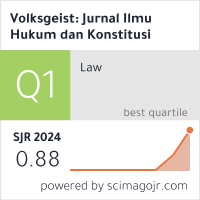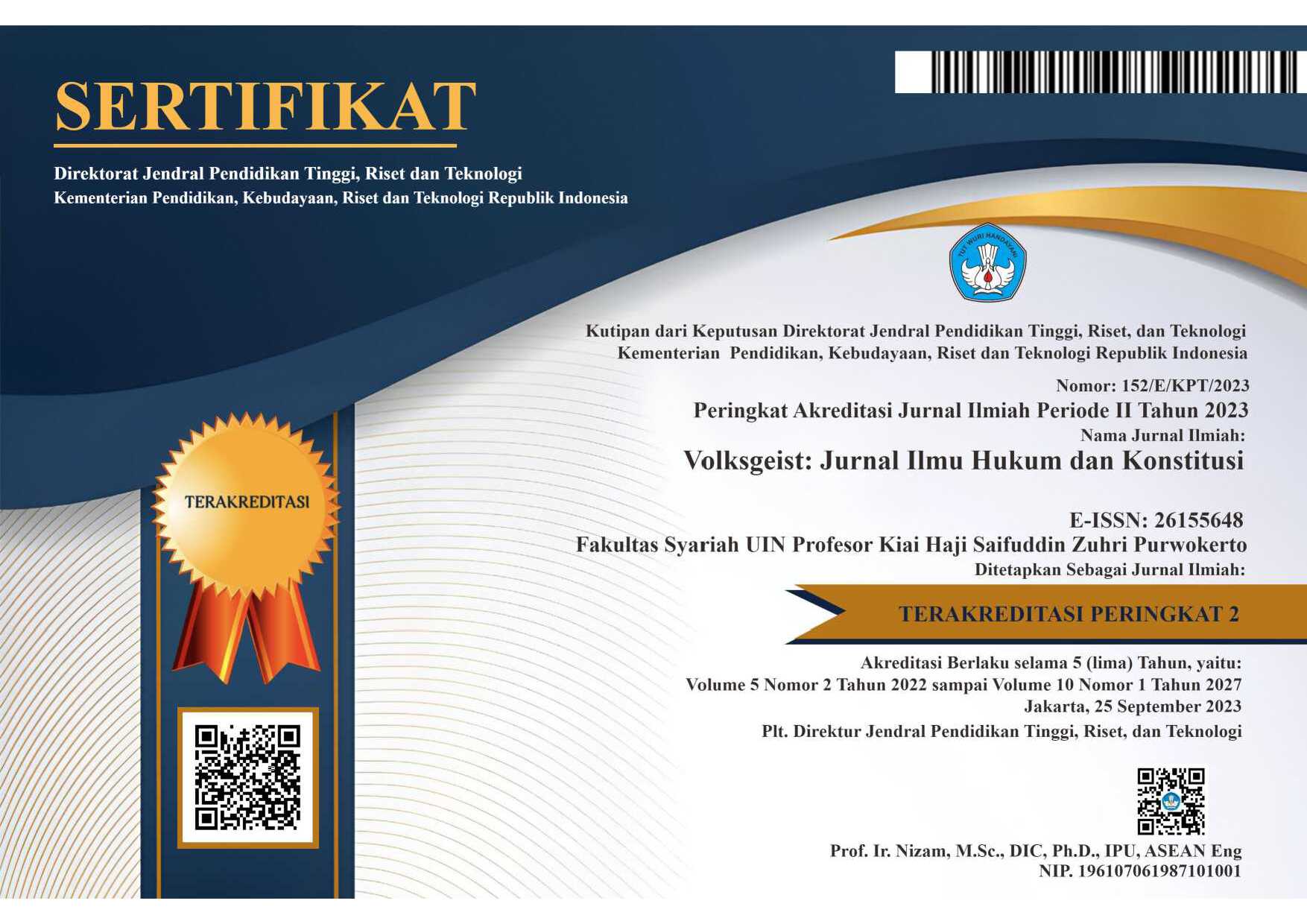Konsep Moderasi Pidana Mati RKUHP dalam Perspektif HAM dan Kepentingan Negara
DOI:
https://doi.org/10.24090/volksgeist.v5i1.6399Keywords:
Death penalty; RKUHP; human rights; state interest.Abstract
The debate over the imposition of the death penalty has long existed between the Abolitionists and Retentionists. The core problem of the debate is that the death penalty intersects with human rights and the interests of the state in maintaining public order. Indonesia, which chooses to apply the death penalty, cannot be separated from these two problematic aspects. This study aims to answer two problems: first, the death penalty debate in Indonesia including its historical aspects; second, the concept of middle ways (moderation) of the death penalty in the Draft of the Criminal Code (RKUHP). This is a normative legal research in which data are collected through library research on legal materials. The gathered data are analyzed in a qualitative description to answer the problems posed in the research. The results of the study show that the death penalty has become a part of the history of Indonesia due to the complexity of the legal system in Indonesia which is influenced by the Dutch, local custom, and Islamic legal systems. The concept of a middle way (moderation) of the death penalty in the RKUHP has placed the death penalty not as a principal penalty but is specific and alternative. Its implementation is also carried out after the probationary period. This is an interesting concept to bridge the death penalty debate in Indonesia. However, there are still problems related to changes to the death penalty, clemency issues, the length of delay in the death penalty and institutions that can amend the death penalty. In addition, there are also problems in determining the death penalty as a result of very serious crimes, because the indicators of most serious crimes have not been determined in a harmonious and consistent manner.Downloads
References
Ali, Zainuddin. Metode Penelitian Hukum. Sinar Grafika, 2021.
Arief, Amelia. “Problematika Penjatuhan Hukuman Pidana Mati Dalam Perspektif Hak Asasi Manusia Dan Hukum Pidana.” Kosmik Hukum 19, no. 1 (2019).
Eddyono, Supriyadi Widodo, Erasmus A T Napitupulu, Ajeng Gandini Kamilah, Antyo Rentjoko, and Lisensi Hak Cipta. Hukuman Mati Dalam R KUHP: Jalan Tengah Yang Meragukan. Institute for Criminal Justice Reform, 2015.
Faiz, P M. “Pendekatan MK Terhadap Konstitusionalitas Hukuman Mati.” Kolom Khazanah Pada Majalah Konstitusi, no. 96 (2015).
Felipe, Miguel Beltrán de, and Adán Nieto Martín. “Post 9/11 Trends in International Judicial Cooperation: Human Rights as a Constraint on Extradition in Death Penalty Cases.” Journal of International Criminal Justice 10, no. 3 (July 2012): 581–604. https://doi.org/10.1093/jicj/mqs041.
Hariyanto, H. “OFFICIAL RESPONSIBILITY AND PERSONAL RESPONSIBILITY IN THE CONTEXT OF STATE FINANCIAL LOSS.” Jurnal Dinamika Hukum 18, no. 1 (January 31, 2018): 103–8. https://doi.org/10.20884/1.JDH.2018.18.1.1861.
Hariyanto, Hariyanto. Hak Asasi Manusia Dan Hukum Pidana Islam. Yogyakarta: Mahameru Press, 2017.
Indonesia, Pemerintah. “Surat Terbuka Yang Dipublikasi Di Jurnal The Lancet : Respon Berbasis Bukti Dalam Penanggulangan Situasi Napza Di Indonesia,” no. 385 (2015): 2249–50.
Jonkers, J E. Buku Pedoman Hukum Pidana Hindia Belanda. Bina Aksara, 1987.
Lindsey, Tim, and Mas Achmad Santosa. “The Trajectory of Law Reform in Indonesia: A Short Overview of Legal Systems and Change in Indonesia.” Indonesia: Law and Society, 2nd Edn. The Federation Press, Singapore, 2008.
Marzuki, Peter Mahmud. “Penelitian Hukum,” 2005.
Putra, Aista Wisnu, and Rahmi Dwi Sutanti. “Kebijakan Formulasi Pidana Mati Bersyarat Dalam Perspektif Pembaharuan Hukum Pidana Indonesia.” Jurnal Pembangunan Hukum Indonesia 2, no. 3 (2020): 319–30.
Santoso, Topo. Asas-Asas Hukum Pidana Islam. PT RajaGrafindo, 2016.
Soerjono, Soekanto, and Sri Mamudji. “Penelitian Hukum Normatif Suatu Tinjauan Singkat.” PT Raja Grafindo Persada, Jakarta, 1995.
Tresna, Raden. Peradilan Di Indonesia Dari Abad Ke Abad. W. Versluys, 1957.
Utrecht, Ernest. “Rangkaian Sari Kuliah Hukum Pidana I.” Surabaya: Pustaka Tinta Mas, 1994.
Zerial, Natalie. “Decision No. 2-3/PUU-V/2007 [2007](Indonesian Constitutional Court).” Australian International Law Journal, no. 14 (2007): 217–26.
Downloads
Published
How to Cite
Issue
Section
License
Copyright Notice
Authors who publish with this journal agree to the following terms: Authors retain copyright and grant the journal right of first publication with the work simultaneously licensed under a Creative Commons Attribution-ShareAlike 4.0 International License that allows others to share the work with an acknowledgment of the work's authorship and initial publication in this journal.











